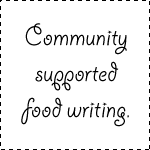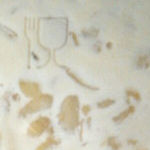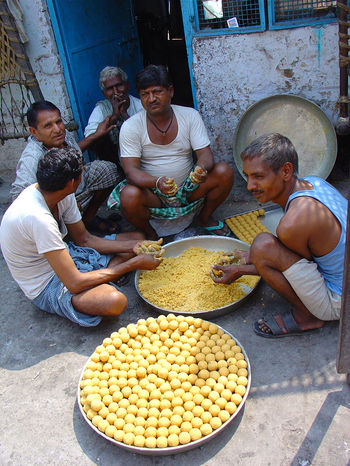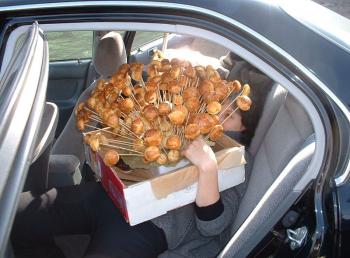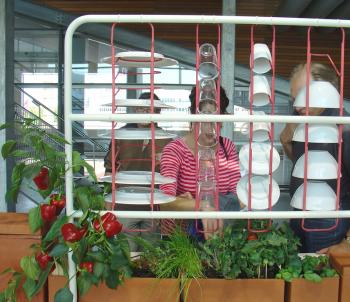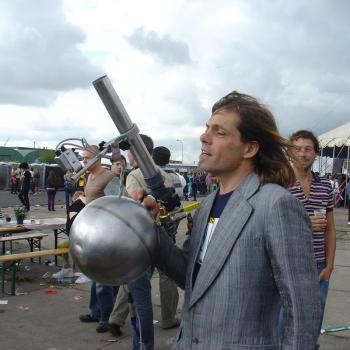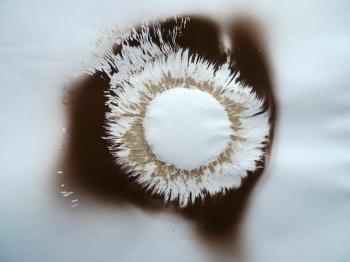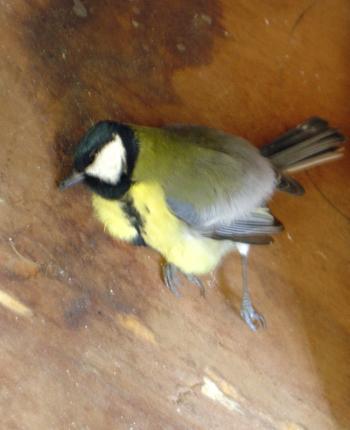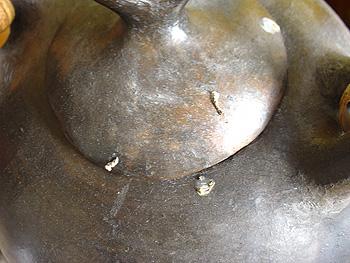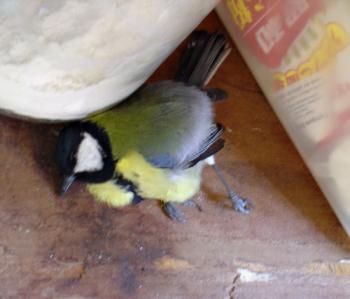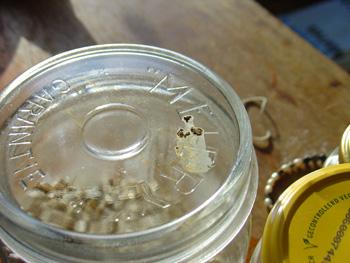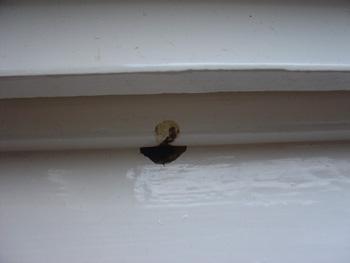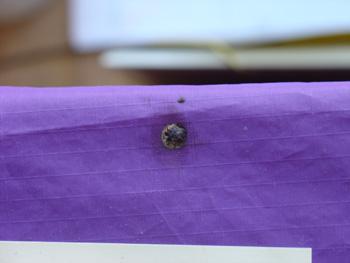Vermin, varmints and my neighbour who votes incorrectly
November 24, 2006
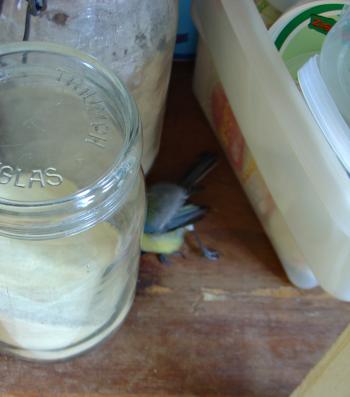
Paros major morbidus, deader than a doornail.
For friends and fambly who received a frantic email, text or who coached me on the phone this morning, here’s an update:
- All dead and feathered animals have been removed from the premises.
- Chernobylicals have been applied to discourage future beasts from entertaining the notion of co-habitation.
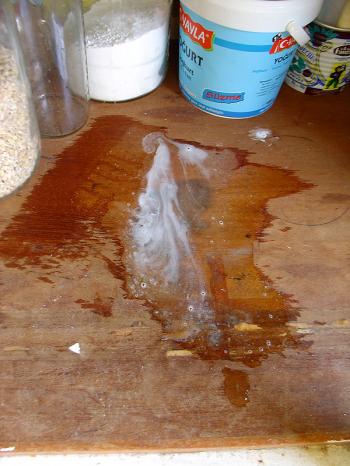
Bleach rohrshach, oddly looks like a bird.
- Barriers have been set up between the interior and exterior of the apartment.
- All utensils, tools and kitchen surfaces have been re-kashered/hallaled short of setting the place on fire.
And just for good measure I donated all of the forgotten pork products to the meat-eating neighbour downstairs who votes incorrectly. Ach, the bacon was way old, and I believe that’s more or less what Jesus would’ve done if he lived upstairs from a Christian ‘Democrat’.
Serves her right, FUQN RIGHT WING HO!
Bring on Pesach, I’m ready as I’ll ever be.
In case you’re not on the intimi in case of emergencies shortlist, be happy and here’s the poop:
Got back from Newcastle only to find my decorative seed collection in its decorative dessicated fruit skin bowls scattered all over the floor. I thought that maybe my homomouse had thrown a party while the cat was away but then I started finding bird poop. Cleaning up the trail I tried to think about it in a positive light. Maybe it’s good luck, like when a bird poops on your shoulder OUTSIDE…
It’s perplexing though, cuz unless you’ve got an opposable thumb and are really into roughage, mine is not a friendly home. I keep all foodstuffs in glass or in the fridge ‘cepting the fruit on the windowsill (untouched), the big sacks of buckwheat that I call pillows (touched), and the purely sculptural moss and weed ikebana (thanks Mom for teaching me ikebana and bedankt friendly farm in friesland). I think it’s fair to assume that the cause of death was the result of what happens when an abundance of roughage meets a bad case of the munchies.
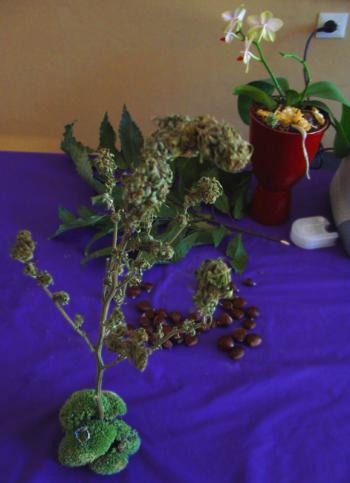
Celebrating Autumn with marijuana ikebana
So last night, when I peered into the cabinet and found a big, huge pile of poop and added that in my head to the other little poops that I had already cleaned up (x 7 carry the 2), I decided to call it a day and reapproach this task after a good night ’s sleep. Cut to this morning, coffee downed, suited up in protective gear, ready for the eventuality of finding living and/or dead varmints in hiding, I started to cleanse. While wondering what the ancestors would have to say about re-kashering a house invaded and pooed upon by an urban bird (they resemble dragons) I was moving the jars around to get some leverage, when I saw the dead bird IN MY CABINET. A LITTLE BIRD DIED IN MY CABINET.
YAKKIS
means
YUCKY
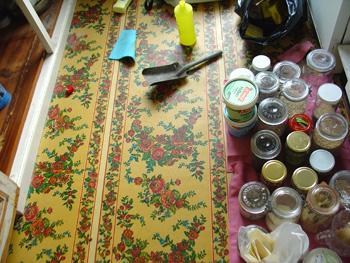
Jewish smetvrees (contamination phobia) dictates that dirty things make other things dirty just by proximity.
What’s puzzling is that although I’m responsible for the deaths of many animals occupying various places on the food chain, the presence of a small, dead animal that I didn’t even kill, makes my toes curl. I was in all states this morning, produced several high-pitched squeals, threw my gloves down and ran to the opposite end of the house to phone people. What’s all that about?
Anywhoozelbees, it’s all cleaned up now and adults are once again welcome.
debra at 21:01 | Comments (2) | post to del.icio.us
Food-related film at the IDFA
November 20, 2006
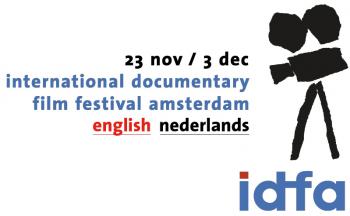
You would be wise to print this simultaneously with the programme of the Shadow Festival if you want to plan your days and nights between the 21st of November and the 3rd of December 2006.
22 films in this year’s the International Documentary Festival Amsterdam (IDFA) are food-related. 3 of the Shadow Festival’s films are food-related. That’s only 25 films we have to see in just 13 days. Piece of cake.
By food-related I mean films in which food is depicted as being inextricably linked to the cultural narrative. The comprehensive list from the IDFA is in alphabetical order, which I know is crazy, but I’m simply not logistically inclined. I will do my best to see (and review!) a goodly portion of this list. If you want to help me out, let me link to your review, let me interview you because you’re the director of one of these films and / or meet in between the delicious hecticity, drop me a line, we’ll drink a glass of wine.
One film that really captured my heart at last year’s (Feb 2006) Berlinale Film Festival and one which I cannot recommend highly enough is Ben Hopkins 37 Uses For a Dead Sheep. This documentary is exemplary of food-related in the culiblog sense of the word.
- 37 Uses For a Dead Sheep
Ben Hopkins (UK 2005) culiblog film review of 37 Uses for a Dead Sheep the definitive list: culiblog counts the actual things you can do with a (dead) sheep Screenings:
25-11-2006, 23:45, Calypso
27-11-2006, 11:30, City 6
29-11-2006, 22:00, City 1
3-12-2006, 11:45, City 3
———————————– - 9 Star Hotel / Malon 9 kochavim
Ido Haar (Israel 2006)In Israel’s occupied territories, thousands of Palestinians work illegally as construction labourers. Together, they share food, belongings and stories, and live under the constant threat of getting arrested - police, soldiers and the secret service are all tirelessly on the alert for illegal workers.
Screenings:
26-11-2006, 14:00, City 6
27-11-2006, 10:00, City 4 (industry screening)
28-11-2006, 16:00, Calypso
30-11-2006, 22:15, City 1
———————————– - Associated
Jenny Perlin (USA, 2006)Brooklyn, 4 July 2004. Jenny Perlin spends her entire Independence Day filming her neighbourhood supermarket. Although the front of the building is dilapidated and the sign is so old you can barely read it, this shop has everything a larger supermarket has, ‘and sometimes even more,’ according to its proud owner Mr. Leem. He and his brother work 14-hour days in the supermarket.
Screenings:
25-11-2006, 12:45, City 2
26-11-2006, 12:15, City 2
30-11-2006, 20:15, City 7
———————————– - Artel
Sergei Loznitsa (Russian Federation, 2006)Yet another
‘Fish Story’ but this time under ice and in Russia. ‘The documentary seems to say that life by the sea has always looked like this and it always will. Or is the final shot, when the ice breaks and the water flows, a reference to the old Soviet masters and an optimistic symbol of imminent change in a frozen social situation?’Screenings:
27-11-2006, 12:30, City 2
29-11-2006, 17:45, City 2
1-12-2006, 17:30, City 5
2-12-2006, 10:00, City 3
———————————– - Amphibious (Login-Logout)
Jennifer Allora, Guillermo Calzadilla (France, China, 2005)Industrialisation gone hay-wire through the eyes of some turtles floating on a log in PRChina’s Pearl River Delta.
Screenings:
25-11-2006, 12:45, City 2
26-11-2006, 12:15, City 2
30-11-2006, 20:15, City 7
———————————– - The Big Family / Da Jia Ting
Huang Lingping (PRChina, 2005)Only four times since 1775 have four generations of the Zhe family lived together under the same roof. Unity, the name that fruit grower Zhue Zhe gives to his newborn granddaughter at the end of the documentary, has a hopeful ring to it. Ever since brickyard owner Zhe traded his prosperous enterprise for a fruit plantation, the debts have been mounting and the family has been going downhill.
Screenings:
30-11-2006, 19:30, City 3
1-12-2006, 17:30, Calypso
3-12-2006, 10:00, City 2
———————————– - Black Gold
Marc Francis, Nick Francis (UK, 2006)Trade is more important to us than aid. GOT IT! See this film.
Website of Black Gold - CHECK IT!
This journey along the long and complex production line of Ethiopian coffee makes an expressive and passionate plea for fair trade. More than 15 million Ethiopians are financially dependent on coffee production. This gripping documentary lays bare the necessity of fair trade.
Screenings:
24-11-2006, 12:15, City 5
26-11-2006, 22:00, City 3
29-11-2006, 10:00, City 1
3-12-2006, 14:00, City 5
———————————– - El Cerco (the fence)
Ricardo ĂŤscar, Nacho MartĂn (Spain, 2005)More fist stories! A calm Mediterranean Sea, one morning somewhere near Cadiz. In nostalgic sepia-coloured images, we see burly fishermen in plain wooden boats prepare themselves to haul in the nets. In a flash, this pleasant scene metamorphoses into a rough battle between man and beast. Dozens of fishermen close in on a school of tuna, surrounding them with their boats. When the fishermen draw in the nets and force the tunas to the surface, the desperate splashing of the fish creates a curtain of water. Shouting with joy, the fishermen haul the giant fish into the boats one by one.
Screenings:
25-11-2006, 15:00, City 2
27-11-2006, 22:15, City 1
28-11-2006, 13:00, City 2
2-12-2006, 18:30, City 2
3-12-2006, 10:00, Calypso
———————————– - Change of Choice / Gaibian
Chen Ling (PRChina 2005)With its 5,000 souls, the village of Zhai Cheng has a total of five more or less paved roads. In the past, this farming community cultivated the wrong crops and since then most inhabitants have trouble staying above the poverty line. Illiteracy is the norm, and the villagers have not managed to keep abreast of modern agricultural techniques. This may change if party secretary Mi Jin Shui manages to get villagers to set up a pepper co-op.
While the differences of opinion between family clans and between men and women continue to rise, the voice-over, completely devoid of irony, comments on the badly needed attempts by a small community to improve its situation.
Screenings:
24-11-2006, 17:30, City 7
28-11-2006, 18:30, City 4 (industry screening)
30-11-2006, 14:45, FM Vondelpark 2
3-12-2006, 12:00, City 7
———————————– - Dinner Time / Chashi jam
Gor Baghdasaryan (Armenia, 2006)It’s dinner time in the home of an Armenian family. The menu consists of boiled potatoes and bread. Armenia, 2006In three minutes, this penetrating film says everything there is to say about poverty.
Screenings:
25-11-2006, 20:30, Cinerama 1
29-11-2006, 14:00, City 1 (Hivos-NCDO Werelddocumentaire Dag)
29-11-2006, 18:00, City 1
30-11-2006, 11:15, City 4 (industry screening)
3-12-2006, 16:00, City 5 (Movies that Matter)
———————————– - Dragon Inn, The Hideout in Temple Street / Chan Chung-Ki
Kwan Winson (Hong Kong, PRChina, 2006)Temple Street, one of the most famous streets in Hong Kong, has a 24-hour economy, five temples and a sultry nightlife. Amidst the bustle, the small Mido Restaurant has been a quiet, culinary refuge for two generations. In fragmented succession, Dragon Inn, the Hideout in Temple Street introduces some of the most remarkable locals who patronise the restaurant.
Screenings:
25-11-2006, 10:00, City 3
29-11-2006, 18:00, City 6
2-12-2006, 14:00, City 7
———————————– - Du soleil en hiver / Sun in Winter
Samuel Collardey (France, 2005)Profils Paysans, Winter on the farm: cows refuse to enter their pen, wells freeze and the roads get treacherous. Michel Collardey, a cattle farmer in Franche Comté, has taken on Francis Pagnot as his apprentice. Together with this young and inquisitive trainee, Michel manages to make the most of the wintry calm on the farm.
Screenings:
25-11-2006, 11:30, City 7
28-11-2006, 10:15, FM Vondelpark 1
2-12-2006, 16:15, City 7
———————————– - The Empire in Africa
Philippe Diaz (USA, Ivory Coast, 2006)More about the failings of international aid than directly about food:
The Empire in Africa”
Sierra Leone is the poorest nation in Africa. Once upon a time, the country was called the Athens of Africa because of its rich raw materials. But the gold, diamonds and bauxite attracted scores of foreign companies that, in conjunction with the government, made sure that the riches did not go to the country’s people. In 1991, a civil war erupted. Only when the media exposed the large-scale amputation of children’s limbs and the fact that humanitarian aid was only reaching certain parts of the country was there any real international outcry. This resulted in a peace agreement in 1999, which was violated shortly thereafter and did not offer the poor population any real protection.Screenings:
24-11-2006, 14:15, Calypso
27-11-2006, 22:15, City 3
29-11-2006, 10:00, FM Vondelpark 2
———————————– - A Gentle Birth
Barbara A Chobocky (Australia, 1976)If you like breasts, you’ll like this film about breastfeeding. As understated as it may be, the film is a passionate plea for immediate physical contact between the mother’s breast and the baby.
Screenings:
28-11-2006, 17:15, City 7
2-12-2006, 10:15, FM Vondelpark 2
———————————– - The Planet
Johan Söderberg, Michael Stenberg, Linus Torell (Sweden, Norway, Denmark, 2006)Twenty-nine experts give their not-quite-pessimistic opinion about the state Planet Earth is in. From Kenya to Brazil, from Shanghai to Greenland, professors, water distributors, directors, entrepreneurs and a wildlife photographer with a gorilla for a pet explain what is happening to our planet. They also present their views on the consequences of the climatic, geographical and anthropological changes in the past and near future. The subject adequately extends beyond listing facts about the greenhouse effect: the film demonstrates how fast developments are nowadays. Our claims on water, air, flora and fauna used to have consequences only locally. As a result of globalisation, we are experiencing a unique event: for the first time in history, what we do at home can have effects on the ecosystem on the other side of the globe. The film quickly presents quotes, facts and examples - leading us to the issue of how we will make do with the one planet we have (actually, we could use five). The main solution is a change in mentality: “There is no cause for alarm. This is a wake-up call.”
Screenings:
24-11-2006, 17:15, City 3 (industry screening)
25-11-2006, 18:15, Cinerama 1
27-11-2006, 22:15, City 7
2-12-2006, 15:00, FM Vondelpark 2
———————————– - Pupusera: A Tale from my Kitchen
Tanya Curnow (Australia, 2006)This film tells the life story of the El Salvadorian refugee Edith Recinos in the form of a history lesson. Complete with drawings, archival photos and personal documentation, we learn about how this strong-willed woman and her two little boys escaped the bloody civil war in their country and fled to Australia in the late 1980’s. In her kitchen, Recinos shows us how to make a dish called Pupusas.
Screenings:
24-11-2006, 11:30, City 4 (industry screening)
25-11-2006, 18:15, City 6
27-11-2006, 18:30, City 7
2-12-2006, 12:00, City 2
———————————– - A Sense of Smell
Edwina Throsby (Australia, 2000)After many years, the Paris-born director returns to her native city to demonstrate what a powerful influence the sense of smell can have on our memory. Meandering around Paris, she ends up at a perfume maker, a florist and a cheese expert.
Screenings:
28-11-2006, 17:15, City 7
2-12-2006, 10:15, FM Vondelpark 2
———————————– - Shit and Chicks
Kees van der Geest (The Netherlands, 2006)Surprisingly enough, behind the hip sounding title Shit & Chicks lurks the story of an old Ghanaian chicken farmer who has an ingenious way of collecting feed for his chickens. The short film is a wordless plea for organic sustainable agriculture. Each day, the old man collects cans of cow manure in the savannah. Back on his own premises, he breaks the dry pies into pieces and dampens the manure again. He trades the freshly filled cans with cans from the day before that he buried around the savannah. Countless termites have collected in them, which are a tasty and nutritious meal for the chickens. It’s an age-old technique that the man learned from his father, who in turn learned it from his father. But how long will this small-scale form of agriculture be kept alive?
Screenings:
25-11-2006, 11:15, City 4 (industry screening)
27-11-2006, 19:45, City 1
28-11-2006, 14:00, Calypso
1-12-2006, 20:15, City 3
———————————– - Tambogrande: Mangos, Murder, Mining
Stephanie Boyd, Ernesto Cabellos (Peru, 2006)Tambogrande is a town in North Peru. Over the years, the inhabitants have taken great pains to transform this initially barren area into a fertile valley. This is where the majority of the national fruit production comes from, including mangoes and limes. The relative affluence of Tambogrande became endangered in 1999, when foreigners began exploring a gold deposit beneath the town. The Canadian firm Manhattan Minerals made plans for a huge mine that would eat up a large part of the town and bring the danger of serious soil and water pollution. The people of Tambogrande preferred mangoes over gold, so they revolted. A grim struggle ensued, documented over the course of several years. In Tambogrande the filmmakers give an account of a murder and show how the government of President Fujimori falls into discredit. Eventually, the inhabitants of Tambogrande manage to achieve some success in their cause and the story of their mainly peaceful protest is heard all over the world.
Tambogrande websiteScreenings:
26-11-2006, 18:00, City 5
28-11-2006, 22:00, City 5
29-11-2006, 10:45, City 3
———————————– - The Tea Film (working title)
Les Blank, Gina Leibrecht (USA, 2006)If necessary, the American tea importer and adventurer David Lee Hoffman will travel to remote parts of China on foot, in search of prime tea varieties. Although he wants to put Chinese tea on the global market, he is also a champion of preserving its uniqueness, tradition and natural production methods. Enthusiastically explaining how every leaf is picked by hand, Hoffman guides the viewer through the wondrous world of tea. Experts make connections between tea-leaf cultivation and viniculture, as soil, varieties, maturity, harvesting time, aromas and differences in production and taste play essential roles in both sciences. When Hoffman comes across a special tea variety, there are no words to express his gusto: I’m just a sucker for tea. Les Blank, who directed The Tea Film together with Gina Leibrecht, is best known for Burden of Dreams, a making-of that detailed the problematic production of Werner Herzog’s epic feature Fitzcarraldo. Herzog reappears in The Tea Film, enjoying a special cup of tea that tastes “like a forest, leaves on the ground, it has just rained, the rain has stopped, it’s damp and you’re taking a walk. And somehow that’s all in this tea.” The version presented at IDFA is a work in progress.
Screenings:
24-11-2006, 16:30, Calypso
28-11-2006, 15:00, City 7
1-12-2006, 10:00, FM Vondelpark 2
———————————– - Transformation / Tuibian
Yang Gancai, Wang Yi (PRChina 2006)In the tropical rainforest on the border between China and Myanmar, a small village lies against a mountain slope. An agrarian people called the Akha live here, secluded from the rest of the world. To acquire more farmland, they chop down trees and scorch the earth, and their rice paddies sometimes don’t even yield enough to live on themselves. The Akha number only 316. The Akha’s self-mockery and humour make room for great agitation and mutual tension. A new era begins, and the old one will never return.
Screenings:
25-11-2006, 14:00, FM Vondelpark 1
28-11-2006, 14:45, City 3
1-12-2006, 11:45, City 3
———————————– - Zo is dat / The Way it Is
Elizabeth Rocha Salgado (the Netherlands, 2006)Jan has spent his whole life on a farm in the Dutch village of Littelbert, in the province of Groningen. Since his mother’s death, he has been caring for the cows, chickens and dogs on his own. The rat that keeps popping up behind the heater takes care of itself. The Brazilian Elizabeth Rocha Salgado made this portrait of a farmer across a span of the seasons for her final project at the Netherlands Film and Television Academy. Salgado quietly observes while Jan practises his daily rituals. Getting up, slurping tea from a saucer, feeding the cows and clearing out the manure, drinking coffee, eating and crawling back under the covers. At regular intervals he washes himself at the sink, shaves and puts on aftershave. He goes out, plays shuffleboard and drinks Dutch gin with Fokje, who cleans for him once a week. The shots are steady and carefully distilled, almost photographic. Salgado has an eye for the vastness and beauty of the Groningen landscape, which she does justice in both master shots and in more detailed shots of domestic life. The camera creeps up close to the imperturbable farmer, who sometimes reveals a trace of longing or nostalgia in his watery eyes. He decorates the Christmas tree and drinks his coffee alone. “There you go,” he says.
Screenings:
24-11-2006, 17:30, City 7
25-11-2006, 11:30, City 7
30-11-2006, 14:45, FM Vondelpark 2
3-12-2006, 12:00, City 7
(Programme notes cut paste cut courtesy of the IDFA website.)
Thank Gawd for food-related film that is so much more than romantic comedy with gratuitous food porn and gluttony as a metaphor for sexual passion.
debra at 7:40 | Comments (2) | post to del.icio.us
Illustrious guests
November 19, 2006
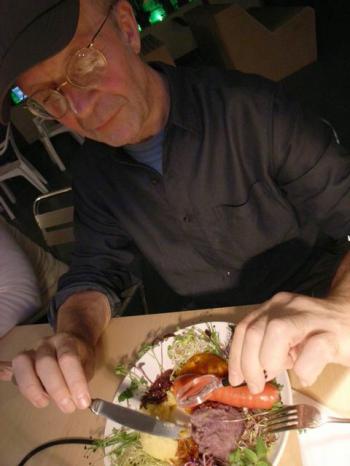
International art critic Paul Groot inspects the work. Photo by illustrious guest Joost Bottema used entirely with permission
Turns out we lingered a bit too long on Mateusz Herczka’s phermone exuding garden furniture, but man oh man did we have a good time last night at the sprout restaurant, political differences aside… The enhanced prototype benches exude a human social interaction enhancing hormone that makes you thrilled to be social, sometimes for days afterwards. Case in point, Mademoiselle Blocq and I had a hyper-hard time keeping shtum at yoga today.
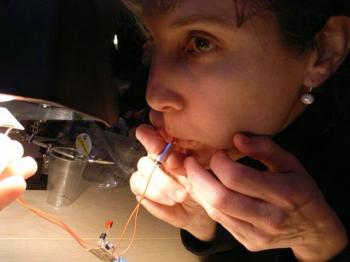
Orally fixated sprout restauranteuse taste-tests the little robots. ‘Tickles!’ Photo by illustrious guest Joost Bottema used entirely with permission
Oh, did I mention that you can weld a robot together after dinner? Menu fixe!
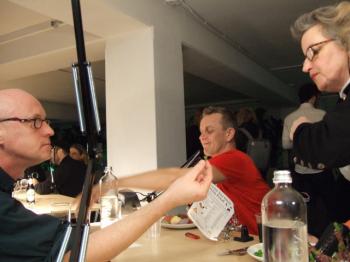
Dutch organic gardening TV star and Amsterdam’s dishiest cake parlour owner slash haute pattissier and Chef Merveilleuse/culiblog covergirl Marlein Overakker scrutinize a micro-green. Photo by illustrious guest Aya van Caspel used entirely with permission
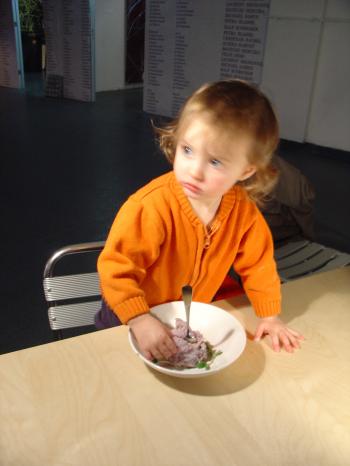
Sprout-enthusiast and toddler Abital Gomperts shows the brothers how to eat with their right hands
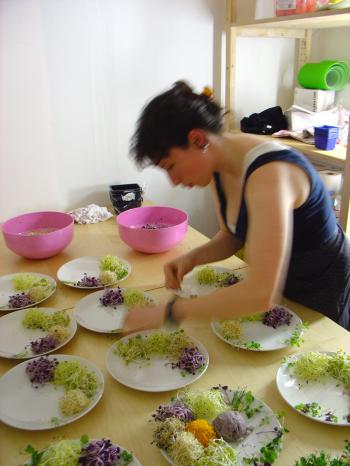
Kitchen Princess Erga (not her real name) transforms each plate into a magical Wundergarten. Sister’s got it all, rosey cheeks, decolletehayhay!
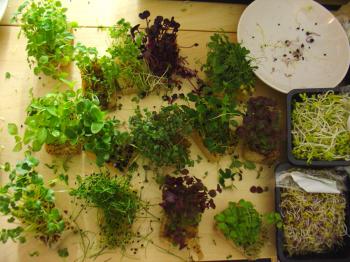
The real stars of the evening!

Bursting with love organic pork sausage, photo by Aya van Caspel
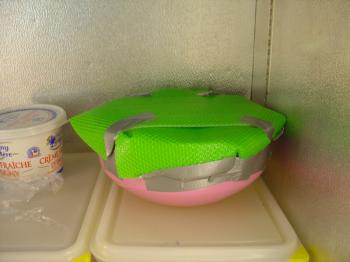
A vernacular design genius keeps the sprouts fresh!
debra at 12:51 | Comments (0) | post to del.icio.us
